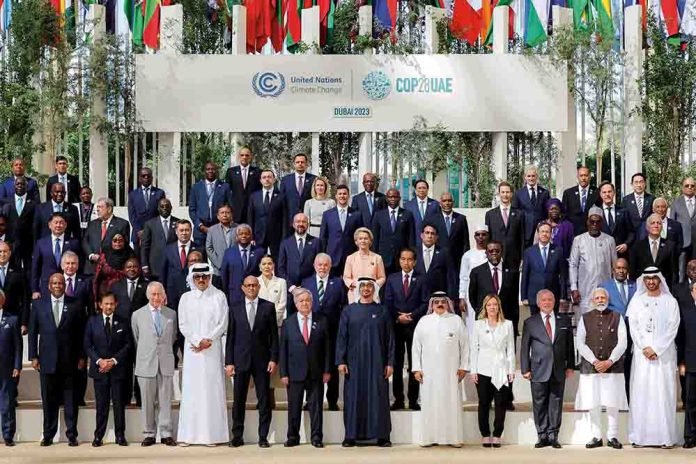The Secretary-General, The Rt Hon Patricia Scotland KC, led the Commonwealth delegation at the United Nations Climate Change Conference (COP28) in Dubai to call for accelerated action on the climate crisis in light of intensifying threats to small and vulnerable member countries. King Charles III also attended COP28.
Scheduled from 30 November to 12 December 2023, the annual summit came just months after Commonwealth environment ministers’ commitment to accelerating climate action at their inaugural meeting, held alongside the 78th Session of the United Nations General Assembly in New York City. The Secretary-General delivered at least 20 speeches across the summit and urged negotiators to deliver a transformative outcome.
This includes accelerating efforts to implement national climate plans mandated under the Paris Agreement, using the findings of the ‘global stocktake’ report to increase ambition and action, and delivering an inclusive, operational Loss and Damage Fund.
Secretary-General Patricia Scotland officially opened the Commonwealth Pavilion COP28, which will host about 40 events across the two weeks, demonstrating the Commonwealth’s ability to convene vital dialogues between governments, experts, businesses, youth leaders, and civil society. She also met with leaders and ministers from Commonwealth member countries and across the international community to advance progress on emissions, finance, adaptation, biodiversity, oceans, health, innovation, and the green economy.
“The worst predictions of climate change have become a daily reality. In the Commonwealth’s most vulnerable countries, fertile lands are turning to dust, wells are running dry, storms and floods are overwhelming communities, and the ocean is rising.

Rt Hon Patricia Scotland KC.
During the summit, the Secretary-General called for increased support for small and vulnerable states, highlighting that despite ambitious pledges, these countries are receiving limited funds to mitigate, adapt to, and build resilience against the impacts of climate breakdown. She drew attention to the broader consequences of the climate crisis on economic growth, leading to high debt burdens, food insecurity, stressed resources, and impaired livelihoods for many of the 2.5 billion people living across the Commonwealth.
These decisions also benefitted the textile sector of these countries as it was decided that the Commonwealth Disaster Risk Finance Portal, which gives countries open, 24-hour hour access to crucial information on financing to manage the impact of disasters better, and the Commonwealth Sustainable Energy Transition Agenda, which seeks to fast-track an inclusive, just, and equitable transition to low-carbon energy systems across the group would be used to aid them.
The Fashion Revolution initiative called on fashion brands to set robust climate targets in consultation with their suppliers and on policymakers to hold them to account for decarbonization. The call to action was issued to coincide with the COP28 climate summit in Dubai, which aims to bring world leaders together to agree and co-ordinate global action to address climate change.
Understanding the gravity of the situation, several pledges were made at COP28. One was the methane pledge, where more than 50 oil and gas companies, including Saudi Aramco, ExxonMobil, and Shell, signed the Oil and Gas Decarbonisation Charter (OGDC) – which calls for net-zero emissions by 2050 or before and near-zero upstream methane emissions by 2030.
Also on the table was a draft resolution regarding the future of fossil fuels – coal, gas, and oil – with one option stating to do “nothing at all,” but oil producers like Saudi Arabia and top consumers like India remained resistant. As the race to abide by the Paris Agreement’s 1.5 degrees Celsius mandate further stresses the urgency of change, Pakistan remains at the forefront of severe environmental challenges due to climate change and various factors. Pakistan is ranked 5th among the countries most affected by climate change. This vulnerability is evident in experiencing extreme weather conditions such as heatwaves, floods, and droughts. But more than that, it allowed Pakistan to learn from other countries’ experiences and best practices in mitigating and adapting to climate change.
In a concerted effort to address the urgent and escalating challenges posed by climate change, the Ministry of Climate Change & Environmental Coordination, in collaboration with the National Disaster Risk Management Fund (NDRMF), organized a High-Level Dialogue on “Pakistan’s Roadmap for COP 28 – Expectations & Goals.” This event was crucial for engaging with national and international stakeholders, including government bodies, development partners, international community stakeholders, UN agencies, NGOs, civil society, the private sector, and academia to strengthen Pakistan’s climate resilience agenda.
This was one of the many series of events, seminars, and dialogues held before COP 28 to brainstorm, be aware, and explore key consideration points to present Pakistan’s perspective and achievements during COP 28. Such efforts have emphasized the need for collective negotiations, awareness, accountability, and action to address the unprecedented challenges facing humanity, the planet, and biodiversity. For efforts to be effective and meaningful, negotiations and dialogues hold great importance.
As the host country for COP 28, the United Arab Emirates has outlined a comprehensive agenda to make this conference a pivotal moment in the global fight against climate change.
Mr. Ahmad Irfan Aslam, Federal Minister for Climate Change & Environmental Coordination, said that such pre-COP events refine our collective negotiating positions. He stressed that our mission is to mainstream climate change in the economy’s economically and socially vulnerable sectors and steer Pakistan toward climate-resilient development.
For the first time, a key document being negotiated at the U.N.’s annual climate summit has underlined the need for the world to do away with all fossil fuels in its draft text. As the first week of negotiations at COP 28 nears an end, the latest version of the Global Stocktake includes a clause committing all signatories to “an orderly and just phase out of fossil fuels.”



